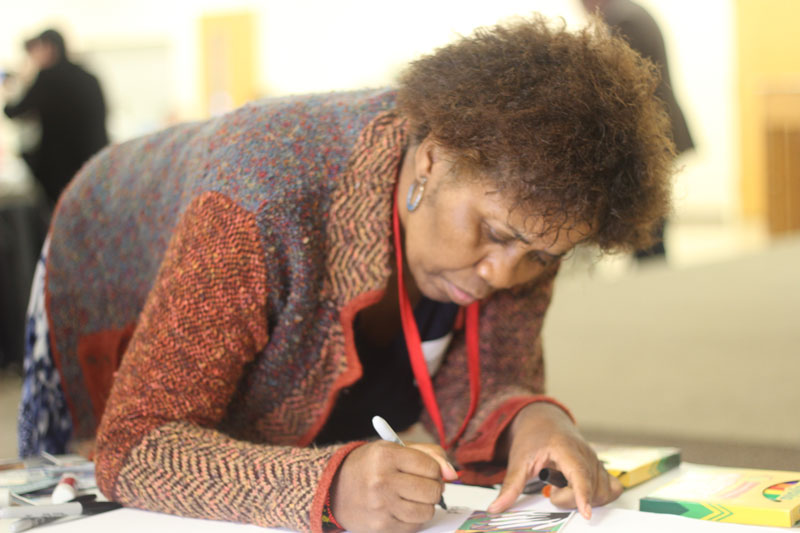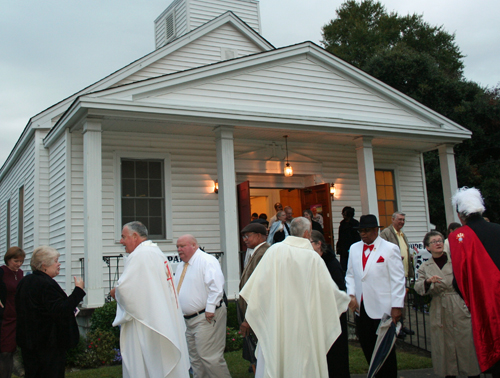
SUMTER—In a season of turmoil, people joined together in a parish hall on a quiet street in Sumter to focus on harmony and understanding between the races.
The theme of peace, and the idea of focusing on it and reconciliation on this date seemed especially appropriate with the election only two days away. This had been, after all, one of the more contentious election seasons in history. Also, it was one of the most difficult years for race relations in the country in recent memory, with the death of African American men at the hands of law enforcement in Minnesota, Oklahoma and Charlotte sparking protests, tense discussions and soul-searching.
The event was called “What We Have Seen and Heard: A Reflection and Dialogue on Peace,” sponsored by the diocesan Office of Ethnic Ministries and St. Anne and St. Jude Church in Sumter.
It brought together a diverse group of Sumter Catholics and people from other faiths, all ages and backgrounds. As the basis for discussion, they used the document, “The Racial Divide in the U.S.”, a pastoral letter written in 2015 by Bishop Edward K. Braxton of the Diocese of Belleville, Ill. In the letter, Bishop Braxton discusses race relations in the United States, events such as the deaths of Trayvon Martin and Tamir Rice, and how Catholics can begin to reflect on them in the context of Church teachings.
 Everyone was invited to frankly and honestly discuss experiences they’ve had regarding race relations in South Carolina and in their communities. Some attendees told painful stories about times they — or their children — suffered racial bias.
Everyone was invited to frankly and honestly discuss experiences they’ve had regarding race relations in South Carolina and in their communities. Some attendees told painful stories about times they — or their children — suffered racial bias.
One woman told a story about how her son said he never wanted to drive her car again because he, a young African-American male, was stopped several times on one road by law enforcement officers while he was driving it, even though he was doing nothing wrong.
“That’s when I understood that when he had an encounter with law enforcement, he could be in immediate danger,” she said. “The problem with something like the death of Tamir Rice is that a child is seen as something other than a child. When that happens, that’s my child. That could be my child.”
Another man described how his adopted son, who is of Haitian descent and had served in the military police, had been stopped and confronted by police officers even though he also was doing nothing wrong. These events, the parents said, left them sad and scared for their children and wary of how others might regard them.
Other people, black and white, talked about experiences they had on the job or in church. One woman, a former educator, said she had a group of black students who always sat together in a classroom even though she let the students pick their own seating. When she asked one of the girls why they always sat together, the student responded “We sit with people who are like us because they know what we’re going through each day.”
There was frank discussion about relations between law enforcement and the black community. Valerie Williams, who is of Hispanic origin, described experiences she has had as a law enforcement officer and the mother of biracial children and grandchildren. Her husband is African-American.
“I tell everybody when you are dealing with anyone, including law enforcement, to be respectful and polite,” she said. “You have to understand that any traffic stop or other stop is a terrifying example for every officer. We don’t know who we are going to be dealing with. I want to go home every single day just like you and your children want to go home every single day.”
One young woman, Candace Peoples of Sumter, said she would like reconciliation to begin by changing how people perceive each other.
“Some people say that they don’t see color, but my goal is to be able to change the connotations of what they see in color,” she said. “I don’t mind if my color is the first thing you see when you see me, but what I don’t want is for you to make a judgment of me as a person because of my color. I wish more school systems would teach our children their history. If you know who you are, you will respect yourself and then respect others.”
There was also a chance for the crowd of about 50 people to ask questions about race relations and police tactics to Sumter County Sheriff Anthony Dennis and Sumter Police Chief Russell Roark III.
Deacon James Williams of Sumter asked the people to think about the different experiences and perspectives they heard during the day, and to rely on the belief in God they shared to work toward further understanding.
And then, before they left, the people in the room got up and prayed. And sang. Together. Before they went out together to face whatever the next week would bring.
Whatever it was, they took with them a message of peace.
Photos/Miscellany/Christina Lee Knauss: Participants take part in an art activity that was part of a dialogue on race relations and peace held in Sumter on Nov. 5.


